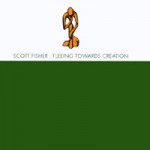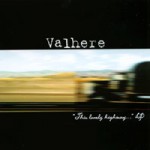 Scott Fisher
Scott Fisher
Fleeing Towards Creation
Burnside Distribution Corporation
Scott Fisher comes to this project with an extensive resume and a sterling pedigree- a situation similar to (but different from) that of Thomas Lauderdale of Pink Martini: especially in the fact that both artists have a very close affiliation to France and the French culture. In Fisher’s case, he comes by in genetically. His mother is French. She is a professor of French at Portland State University, as well as the Honorary Consulate of France in Portland. Scott spent a part of his childhood in France, living in Bordeaux and Paris.
Having studied piano since the age of six (for several years with an exiled German piano instructor) Fisher’s musical influences are many and varied from Classical music to the works of some of the Jazz greats; such as, Miles Davis, Herbie Hancock, Steely Dan and Frank Zappa. After college, when Scott moved his band Soular to Portland in 1998, his musical pursuits were more in that vein. For, one thing is certain: Scott Fisher is a very talented pianist (as well as being quite accomplished on organ and synth).
Because of his impressive ties to France (and maternal connections, too, no doubt), as well as his impressive musicianship, Fisher was selected to represent the French Embassy, with a showcase at the Winter Olympics, entitled “French Sound Goes To The Olympics.” According to Gregory Doucet-Lasne, cultural attaché for the French Embassy, “We wanted to showcase a modern French/American sound. Someone shiny, innovative, creative and sexy. Scott Fisher fit our needs perfectly.” Machiavellian espionage at the highest levels? You be the judge.
However, nothing Fisher has released, up to now (other than last Fall’s EP, which contained versions of a few of the songs found here), would prepare one for the this Pop equivalent of the second coming of Elton John.
Think of Elton John in his earliest period. Elton of Empty Sky, Elton John, Tumbleweed Connection and Madman Across the Water– full of blustery vocal mannerisms and complicated emotional energy; still formulating his singing personae.
Project that person at that stage in his career, thirty-five years into the future, to our present day, and there would be Scott Fisher. His vocal resemblance to Elton John (of that early period) is uncanny, nearly to the point of distraction. You keep waiting for Fisher to break into “Goodbye Yellow Brick Road,” “Love Lies Bleeding.” or “Where To Now St. Peter?”.
And at times you can hear a Sting-like turn of melody, a Dave Matthews-ish idiosyncratic vocal mannerism. A hint of Lennon, a wisp of McCartney, a touch of Billy Joel. A dash of Karl Wallinger in World Party. A soupcon of latter-day Tears For Fears. Faint droplets of Joe Jackson and Bruce Horsnby. Brief glimmers of Radiohead, Elliott Smith, Coldplay, Ben Folds, David Gray. All the Pop piano masters, in their ways, to be sure.
But, nowhere do you hear any references to Miles or Herbie or the like. Well, almost nowhere. Scott does cut loose with some seriously resonant keyboard chops on “L’Instant Present,” one of the songs he played at the Olympics. The rest of the album, however, is as musically adventurous as Captain Fantastic– which is not a knock, mind you, it is just that the perspective is colored by obvious and manifold references to Elton John.
The opening track, “Nothing” is nicely decorated by a plaintive piano figure, faintly reminiscent of McCartney’s “Martha My Dear,” from the Beatles’ “Double White” album, before jumping into a Sting meets Elton sort of verse. Drummer Michael Partlow adds a syncopated drum pattern that helps the song turn that musical corner. Partlow has been playing in the local scene since the early ‘90s, with Soul Patch. Throughout this project, his drumwork is deceptively simple, solidly in support of Fisher’s songs. Here, the melody of the chorus faintly echoes that of Dolly Parton’s “I Will Always Love You.”
Similarly, a few strands of Zaret and North’s “Unchained Melody,” Sonny Bono’s “Needles And Pins,” and Elton John’s “Daniel,” among a few others, are woven into the melody of the chorus to “Couldn’t Find The Words” a song accented, at times, by a sprightly, Disco sort of feel. “Struggle” begins with a serious acid jazz groove for about fifteen seconds, before slipping into a poppier setting. Fisher’s rap sounds strongly reminiscent of Curt Smith’s on Tears For Fears’ “Sewing The Seeds Of Love” from a latter-day version of the band, with a skittering ska for a chorus.
Scott’s piano arpeggio flutters around a moody progression on the title track. Burbling synths wash and warble through the mix, adding texture, a contemporary feel and a sense of depth and space (literal and figurative). A good song. “All I See” is a singular ballad that could easily be an outtake from Elton’s “Burn Down the Mission” period.
A bit of a Hancockian intro embellishes “Crisis,” which has a vaguely Steely Dan-like chord progression and intimations of Dave Matthews, but still sounds like Elton John. Fisher’s husky baritone is placed in precisely the same part of his throat, face and chest as Elton John in his early years. The similarity is downright eerie.
“Promises,” with strings rippling through the verses, again sounds like an outake form Tumbleweed Connection. However, a spirited organ/piano interplay in the first break gives an indication of what Scott can do on keyboards when he opens up a bit. The second break, a sort of tribute to the concluding suite of the Beatles’ Abbey Road, is briefly impressive, before an abrupt end.
Another cool hip hop groove serves as the intro to “Words Unsaid,” which captures the melodic spirit of Joe Jackson’s “Stepping Out,” with ringing, roiling piano flourishes rumbling underneath in a similar fashion, as well. Very cool. “Feel” has an appealing rhythmic convergence between Scott’s eight-to-the bar-piano delivery and Partlow’s “behind-the-beat” accompaniment. Bassist Matt Voth distinguishes himself with his energetic work on this winning number.
The French lyrics to “Te Perdre Encore” prevent Fisher from employing most of his annoying vocal mannerisms, exposing, for once, his real voice: including a pleasant falsetto that calls to mind that of Brian Wilson. Though it’s not one of the stronger songs among the fourteen presented here, it is still a welcome change.
The aforementioned “L’Instant Present” plays on Voth’s driving bassline, coupled with vibrant brass parts and Fisher’s chortling electric piano expositions, redolent of Herbie and Jan Hammer. Hot! Scott imagines for “Fade” a Lennonesque piano stylization. The arrangement, replete with elegant strings and a beautiful interlude between brass and Scott’s orchestral piano continues on a long slow fade.
Scott Fisher stands out as a huge talent. His piano playing is top-of-the-line. His songwriting is consistently strong. But at times the arrangements seem fragmented, as if jumping from segment to segment. Fisher displays a knack for a hook and an uncanny ability to fuse memorable melodies. But his reliance on vocal histrionics is distracting– to the point that one cannot get at all close to Fisher’s lyrics. They are simply not a factor. They are nearly incomprehensible, owing to the blather Fisher insists on incorporating into his vocal presentation.
Were Scott to discontinue his efforts to mug like Eddie Vedder, Scott Stapp (of Creed) or Dave Matthews and simply rely upon his real voice (as on “Te Perdre Encore” and “L’Instant Present”) the results would be far more pleasing and he would not sound nearly so much like Elton John. Scott Fisher could be so much more than the new Elton John.
 Assisted Living
Assisted Living
K-12
Self-Produced
This lively trio became Assisted Living in 2001, after guitarist/vocalist John Colgate rebuilt the band, having previously played around town under the name Blyss (whom we reviewed in November 1999) for several years. They take their cue from the likes of Mercury Rev and Red Hot Chili Peppers, Peter Gabriel, with maybe a touch of Nine Inch Nails thrown in. It’s a heavy, Metal/Funk sound with elements of Techno/Electronica thrown in, as well. The band is air-tight, executing their arrangements with laser-like precision.
Bassist Ben Holden and drummer Jonas Marcus contribute additional vocals in the case of the former and an array of samples in that of the latter. Together, Colgate, Holden and Marcus forge an intricate sound that Rocks fiercely. Take for example, the lead track, “The Time Is Now.” An onrushing train of rhythm section and samples propels the song, while Colgate’s craggy voice and stellar guitar work ride upon the wake. Colgate’s voice resembles Peter Gabriel’s, a melodic mutter, gritty and gruff. Musically the track echoes Mercury Rev.’s penchant for industrial strength samples. Mighty!
Taking a Poppier approach with “Useless,” Holden’s seamless harmony vocals and Colgate’s power-chord motivation behind the arrangement, lend an ‘80s sensibility to the song, which is diminished somewhat by an imaginative middle-section. Still, it’s an attractive cut, with a lot of swagger and bluster.
The first few verses in “Smoke & Mirrors” bear a certain sophistication reminiscent of the Police. Colgate’s subtle guitar machinations are accented by Marcus’ authoritative, Copelandish snare smacks. But, a couple of minutes into the song, it explodes for about forty seconds of fury before calming down, then shredding again with a tough chorus.
Further defining the extensive musical parameters this band explores, “Wake Up” careens sideways before erupting in the second verse, a stylistic device worthy of our dear departed Nirvana, transformed here into Metallic supermen. It’s an impressive display. Like Nirvana’s “Rape Me,” with some serious rage behind it. Eek! You think Kurt Cobain was pissed… However the bridge here, is a one that Cobain could never cross– neither musically nor personally. A transcendence, which reasons above the mundane. Impressive, to say the least.
A jackbooted anthem to all the leadfooted tailgaters of the world, “Drive Real Fast” changes lanes without signaling and passes on the shoulders, spiraling headlong towards an unknown destination. Stay to the right for faster moving traffic! Middle Eastern handdrums dance around Holden’s churning bass for the brief instrumental “Jelly,” which, as with some of the material in their previous incarnation, sounds like excellent ambient soundtrack material. Colgate’s highly-effected voice on “ Awakened” is squeezed through a muted megaphone before slowly emerging, as if, perhaps, from a dream, into a Korn-like vehemence of intensity.
“Tunnel Vision” ambles tentatively for the first verses, before asserting itself with a memorable chorus, comparable to something Live might produce. A violin-like guitar solo melts into an iniquitous, Papa Roach-like rap. Hot! Alice In Chains is evoked with the vocal harmonies of “The Way.” Marcus’ deft drumming pinions the structure of the song, allowing Colgate to expound on guitar, as well as vocalizations.
Holden’s thumb-heavy Funky bass pluckings impel “Move,” a fast paced ditty, with eerie undertones and Colgate’s seriously aggressive guitar phrasings. The first secret track utilizes several string synth samples, though it is unclear how they are being generated. Whatever the case, it is a wonderful song, with World beat drums and effects, as well as Colgate’s best Peter Gabriel turn. Another great song. The second secret track is a wobbly rap that maneuvers drunkenly, behind a rheumy keyboard. Red Hot Chili Peppers come to mind on this one.
Assisted Living pick up where Blyss left off, with precisely executed numbers which, while they resemble, somewhat, their influences, give obvious indication of an original sound as well. The band displays a spirit of adventure and a cohesiveness that is essential for the genre they are exploring. The future, indeed, would seem bright for Assisted Living.
 Valhere
Valhere
The Lonely Highway
Self-Produced
Valhere are an enterprising young quartet, who have been together (in the case of three of the four members) around ten years. Their sound, probably intended to fall into Counting Crows territory, often recalls The Replacements, more than any other group, with vocalist/guitarist Andy Koontz doing his very best Paul Westerberg imitation, while taking a stab at Adam Duritz. The band is slightly loose around the edges, but they exude a certain charm, all the same– working familiar Pop powerchord progressions with heartfelt earnestness, typically associated with Country music.
The band has matured since their first album, Instantly, Promise, a five-song EP, released in early 2001. Lead guitarist Scott Phillips– who doubles as the Sunday Weatherman at KPDX-49 television (and whose career cannot feel too secure just now that the parent company of KPTV-12 has bought KPDX, and is in the process of combining news departments and other staff), is now fully integrated into the band. He adds thoughtful hooks and succinct solos on lead guitar, as well as vocal high harmonies, lending the band a sense of refinement.
Here, Valhere (the name is taken from a character in the Cameron Crow film Say Anything) offer nine original songs, plus an additional acoustic version of the song “Come On.” Much of the material has been in the band’s repertoire for quite some time. This collection is seen by the members as an opportunity to woodshed this material and move on to new songs. The album was mastered by legendary sound engineer Bob Ludwig, and features sonic crispness and punch from start to finish. Koontz’ vocals are given special prominence in the mix.
The opening track “Heartache” is straight out of the Replacements songbook and stands out as one of the catchiest songs of the set. Koontz’ gravelly voice grinds out the lyric, in what could also pass for a song the Wallflowers might do. Phillips adds a fine guitar solo in the middle. A good song. Koontz exhibits a folksy twang that Adam Duritz could only feebly approximate on “Standing Around.” Phillips’ high harmonies add to the Counting Crows feel (although Valhere rock harder).But the mournful country motif also calls to mind the work of J. Bowman in our own late, great Thrillbilly.
Working over a “Knockin’ On Heavens Door” motif, “Go Away” is a simple and straightforward ballad, noteworthy for the fact it is the oldest song on the band’s playlist, dating back to their first gigs back in 1995. “Cold Hard Heart” is another keeper, though there are a few rocky rhythmic sections in a couple of places. Koontz’ impassioned vocal is the loci of the song.
“Pain,” as with all the songs, is a very personal song, that for Koontz has a very specific meaning. This creates an added emotional component to his vocal delivery that seems to speak directly from his heart. An oddly distorted organ and acoustic guitar mar the country-tinged title track. The acoustic version of “Come On” is superior to its electric counterpart, offering a soulful rendition that is out of the realm of what this band typically does. The secret track brings us full circle to where we began, with the band sounding a bit like the Replacements– with chord changes bucking like an old prairie bronco.
Valhere are a “family” band. The members live together in a house in which they have built the studio in which the band recorded this project. They will go it together, sink or swim. The band has several strengths– good songwriting and decent musicianship among them.
They have weaknesses as well, especially in the rhythm section, which is occasionally not at all solid. Some other choices the band makes within the course of this project seem misguided. But that is the recording and production process in a nutshell. It would serve this band well to spend some time around a metronome or a drum machine. They need to seriously hone their rhythmic chops. But, on the other hand, Valhere show a lot of potential and deserve recognition for their music; and encouragement to continue to grow.
